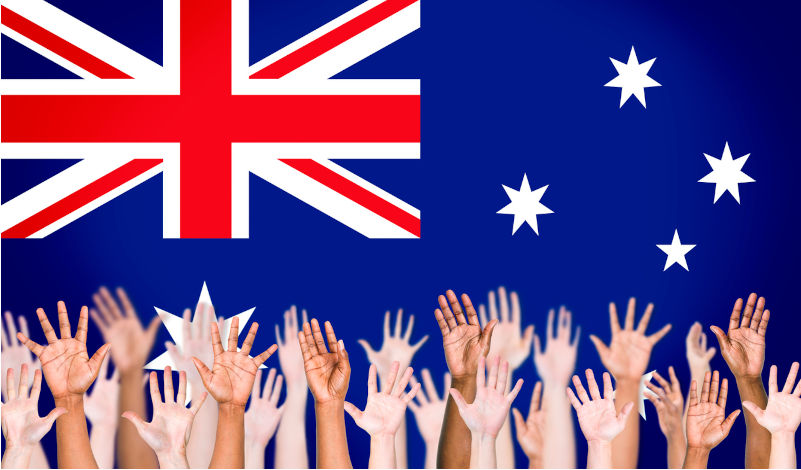Australia Day: The differences that unify
January 25, 2024
Australians are a perverse bunch. We tend to exhibit two distinct and contradictory sentiments every Australia Day. For many, it is an excuse to bask in overweening pride and to declare loudly our normalcy as citizens of this great land. It presents an opportunity for flag-wavers, anthem-singers, chauvinists and proud nationalists, to strut their stuff. It is grist for the mill for what populist politicians call Team Australia.
But scratch a little deeper in various quarters and you will inevitably find disaffection an intellectual frustration that baulks at the very idea of overt nationalism or (even worse) jingoism.
Australia Day is really all about symbols, their use and misuse, and how we determine normalcy. We all recognise what is normal. It is the lifestyle that is lived by normal Australians like you and me. Unfortunately the reality is that OUR perception of normalcy is often very different from that of other Australians.
Normalcy is a subjective assessment based on experience and experience is necessarily egocentric. We can attempt to perceive other lifestyles vicariously through other eyes by (for example) reading books and watching movies, but what we see and hear is inevitably still understood through the filter of our own lives and our own psyches. If our lives are filled with humdrum mundanity then so will be our expectations of normalcy. For many Australians normalcy is straightforward. It is football and meat pies. It is barbeques and cricket. Its symbols are the Australian flag and Advance Australia Fair (which should be flaunted at every opportunity). Thats what makes us Australian and if you dont like it then leave! Such a view is beguiling in its simplicity.
But for the iconoclasts among us and I admit to being one the overuse of national symbols such as the flag has disturbing connotations. It creates an unnecessary separation between us (whose origins may be reflected in elements of the flag) and them (whose origins may be different). It harks back to darker times in world history when symbology was used by malignant regimes for more pernicious purposes. It results in a particular type of pride that may be more divisive than unifying.
The Oxford English Dictionary defines pride in two distinct ways. PRIDE can be a feeling of deep pleasure or satisfaction derived from ones own achievements, the achievements of ones close associates, or from qualities or possessions that are widely admired. But a second definition can also be found: the quality of having an excessively high opinion of oneself or ones importance. The first definition suggests a sense of fulfilment and camaraderie, the second has overtones of hubris and conceit. The first denotes inclusion, the second: exclusion. It could be argued that the 2005 Cronulla riots and the recent Melbourne street marches of hooded Nazi supporters resulted from an excess of the latter type of pride among certain segments of our community. It is a worrying development.
Now dont misunderstand me! There is nothing wrong with a little national celebration. But if our revelry engenders merely pride of the disdainful type, then it is far too easy to lapse into egotism and divisiveness with consequent problems.
The truth is that Australian society is now made up of a complex warp and weft of cultures, lifestyles and socio-economic groupings through which is woven a Common Thread and it is, in reality, this that serves to unite us all in what we consider to be our normalcy. This Common Thread consists of a combination of qualities to which we should all aspire, even if some of us do not seem to exhibit them as often as we might. It comprises (I suggest) three key elements. None of them are uniquely Australian, but all are encompassed in one way or another in those quintessential Australian traits, Mateship and a Fair Go. It is axiomatic that the worth of a civilisation can be measured by its treatment of its weakest members, and it is this fact that engenders the bonding that results in national cohesion. More specifically, our Common Thread involves an AWARENESS of the diversity that exists within the Australian community. It entails COMPASSION towards those who are doing it hard. And it requires GENEROSITY a willingness to share with others the bounty that is a part of the Australian way of life.
Essentially, that is what Mateship is all about. That is what is meant by a Fair Go. These notions seek to embrace and celebrate difference as an integral part of the Australian ethos. They are not about flag-waving. They are about acceptance and sharing.
Therefore in my iconoclastic way let me suggest that we put all flags aside this Australia Day. Let me propose that whatever hat we are accustomed to wearing, be it akubra or panama, yarmulke or turban, hijab or baseball cap we should acknowledge that there is more that unites us than divides us, and we should all adopt a smile as a metaphorical symbol of solidarity with those many Australians who are a little different from us, but who are, nevertheless, normal.
Who knows? Perhaps one day our political leaders will follow our lead.
